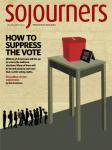CHEF IS A small-budget film with an all-star cast and artful storytelling. Jon Favreau, who also directed Iron Man, stars in his own film as a head chef named Carl Casper at an acclaimed restaurant in Los Angeles. Casper is left in a vocational tailspin after a scathing review and a public meltdown. He loses his inspiration and finds himself in an existential crisis.
In Chef Casper’s quest to recover his culinary mojo, he takes a trip to Miami and buys a used food truck. The film plays on the power of relationships in a messy, winding, but authentic path. Chef Casper’s community—his ex-wife, his son, and his best friend—are invited into the one thing Casper loves to do, demonstrating how community, at its best, can propel us on the way we should go.
Each truck stop on the journey back to California fills Chef Casper with new vision and adds distinctive ingredients. He makes his way to once again bring beauty and flourishing back to his street corner of the world.
My small group at church watched Chef together and bonded over it. We explored themes of vocation—how we can contribute to flourishing through the distinctive things “we’re good at.” And how activism isn’t just about waving the proverbial picket sign; it also can be about loving what we do with great friends.
Highlighting these conversations and convergences with Hollywood and life are vital for my own work. The congregation I serve in East Harlem consists mainly of nonprofit professionals, educators, and human service workers—convincing these folks about shalom and justice is not usually a challenge. What they hunger for is guidance in cultivating meaning through the crises and mundaneness of life and work.
People will often ask things like, “What difference do my actions make in the world?” My response: It all can work toward flourishing.
My words are not an attempt to soothe away the question or cook up synthetic inspiration. I truly believe that small actions in the world can make a huge difference—particularly if we live our lives day-to-day, meaningfully, honoring each 24-hour square in our planner.
Rather than seeing our work as just a drop in a large ocean, perhaps we can think of the butterfly effect, in which, as the Oxford Dictionary describes it, “a minute localized change in a complex system can have large effects elsewhere.”
Chef reminds us that even in preparing a simple meal we create spaces for people to connect and make memories. We can learn about the farm-to-table journey. We can generate great joy in serving meals to our loved ones. As Michael Pollan writes in Cooked, “is there any practice less selfish, any labor less alienated, any time less wasted, than preparing something delicious and nourishing for people you love?” Even food, an impermanent thing, can leave an imprint on people’s hearts and memories, and bring nutrients to billions of cells and the vital organs in our body.
This is the kind of rant quality films like Chef can inspire if we become present to the convergences of faith and an engaged life in our culture! Or, at the least, Chef will be a great time for movie night with activist friends, who might want to revisit their own work and creativity in the pursuit of human flourishing.
As Chef Casper says in the film, “I may not do everything great in my life, but I’m good at this. I manage to touch people’s lives with what I do, and I want to share this with you.”

Got something to say about what you're reading? We value your feedback!
